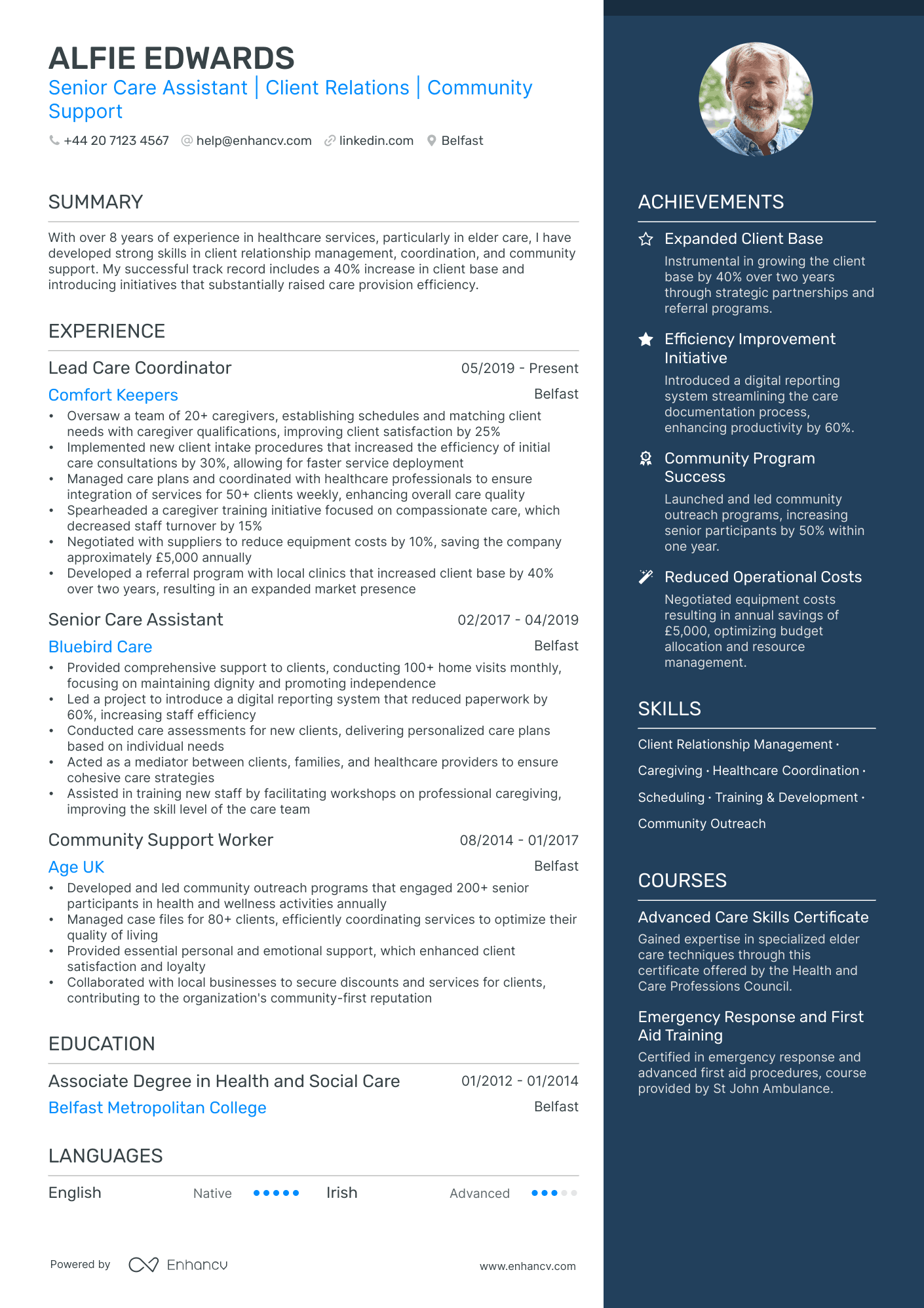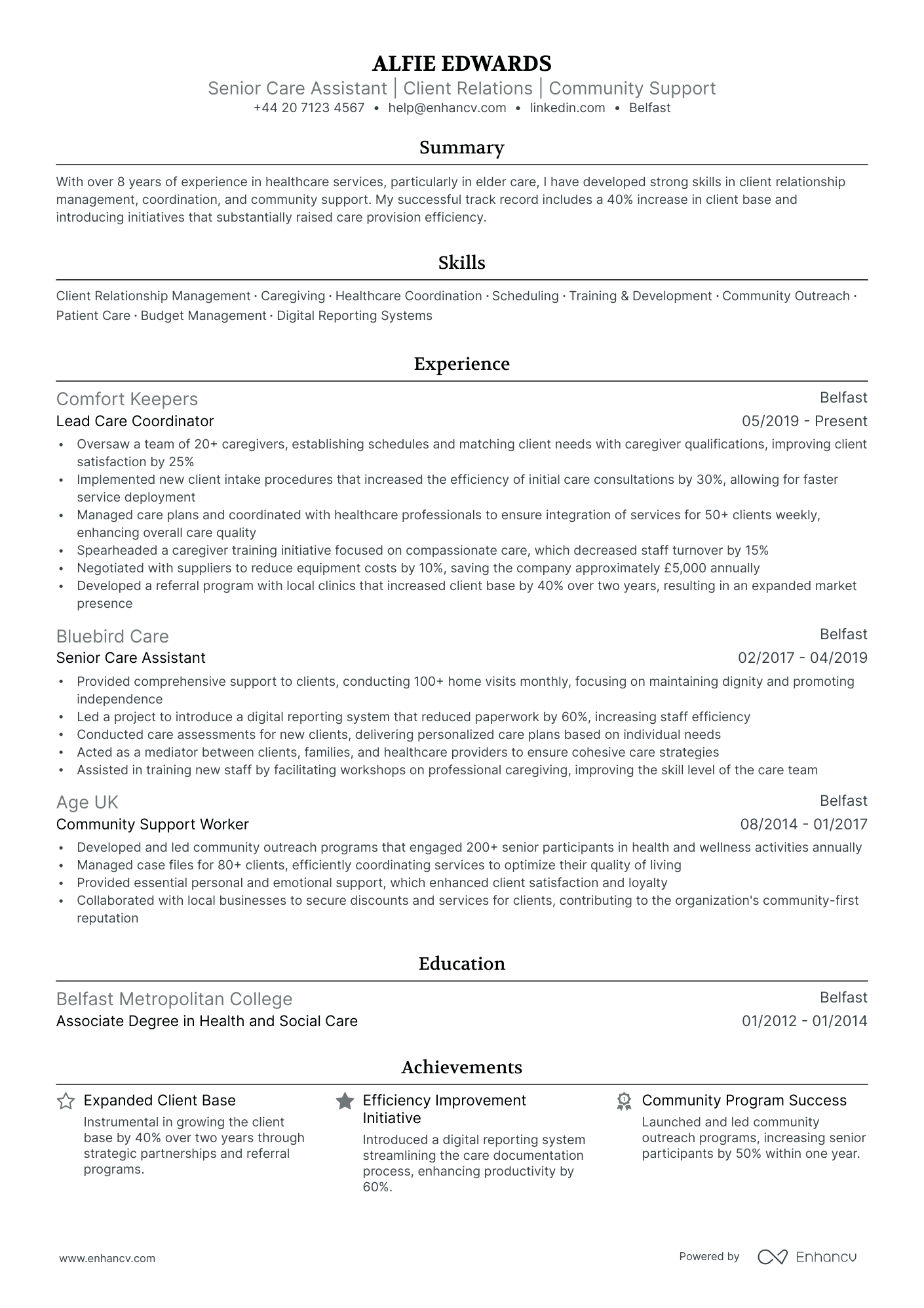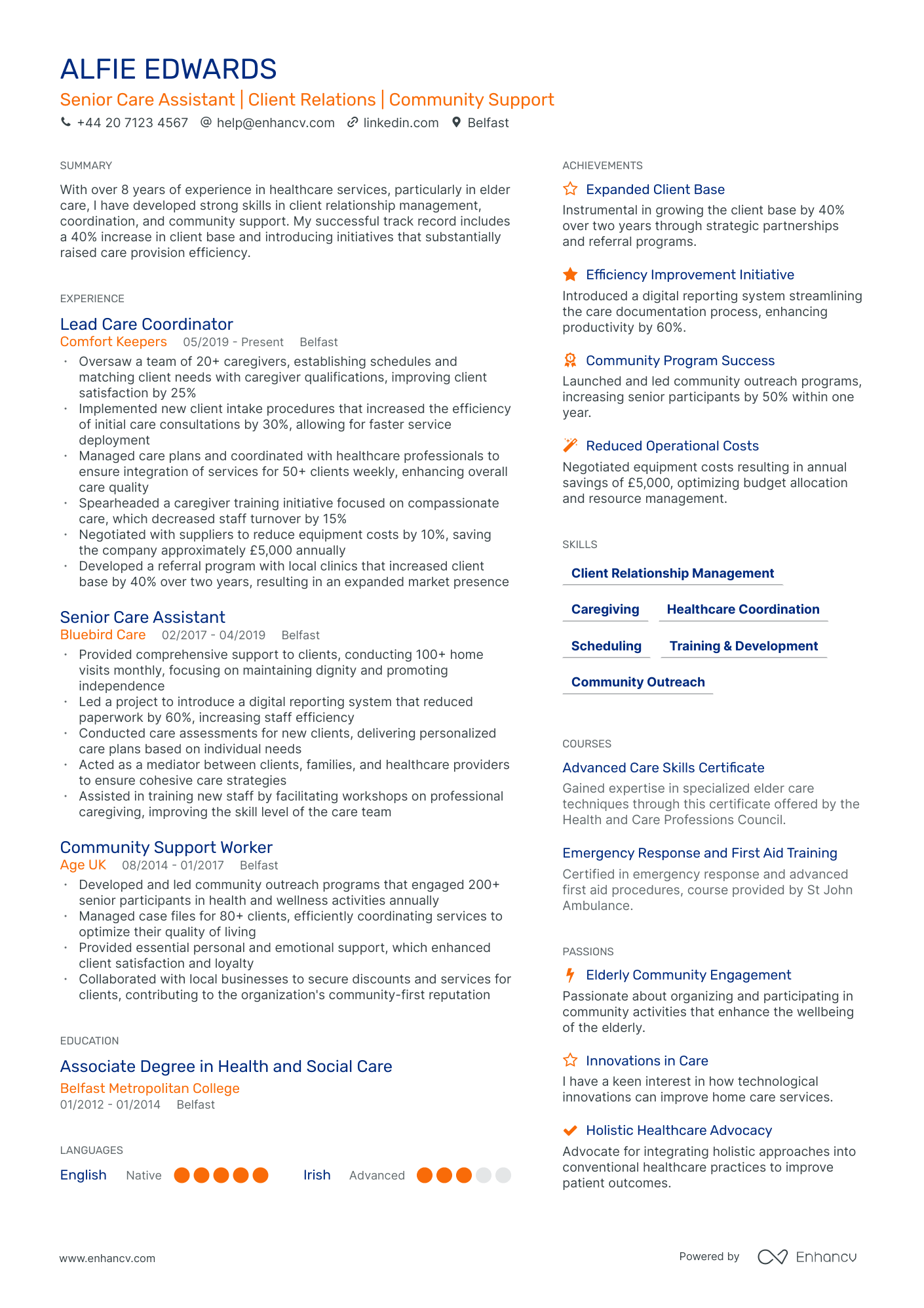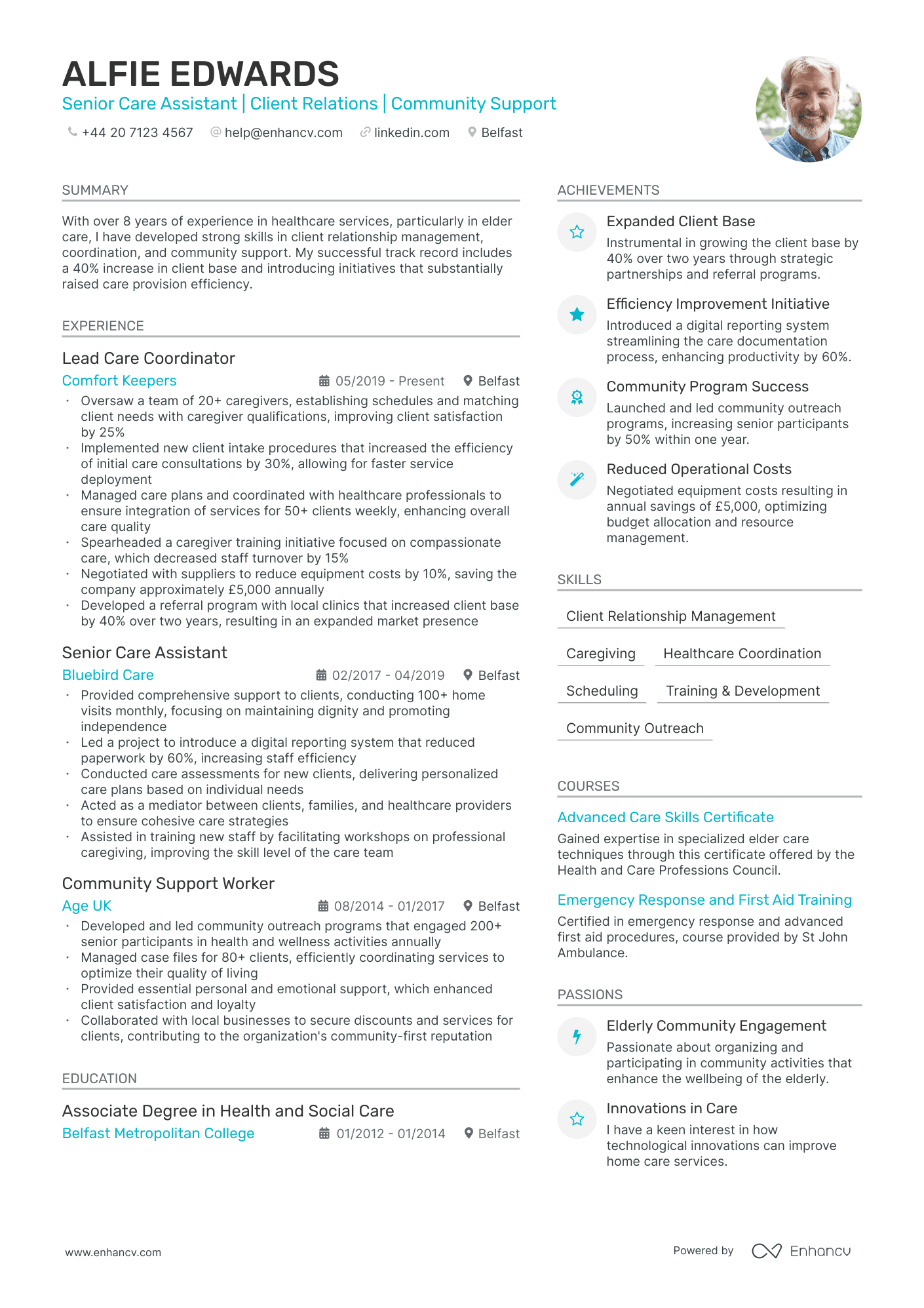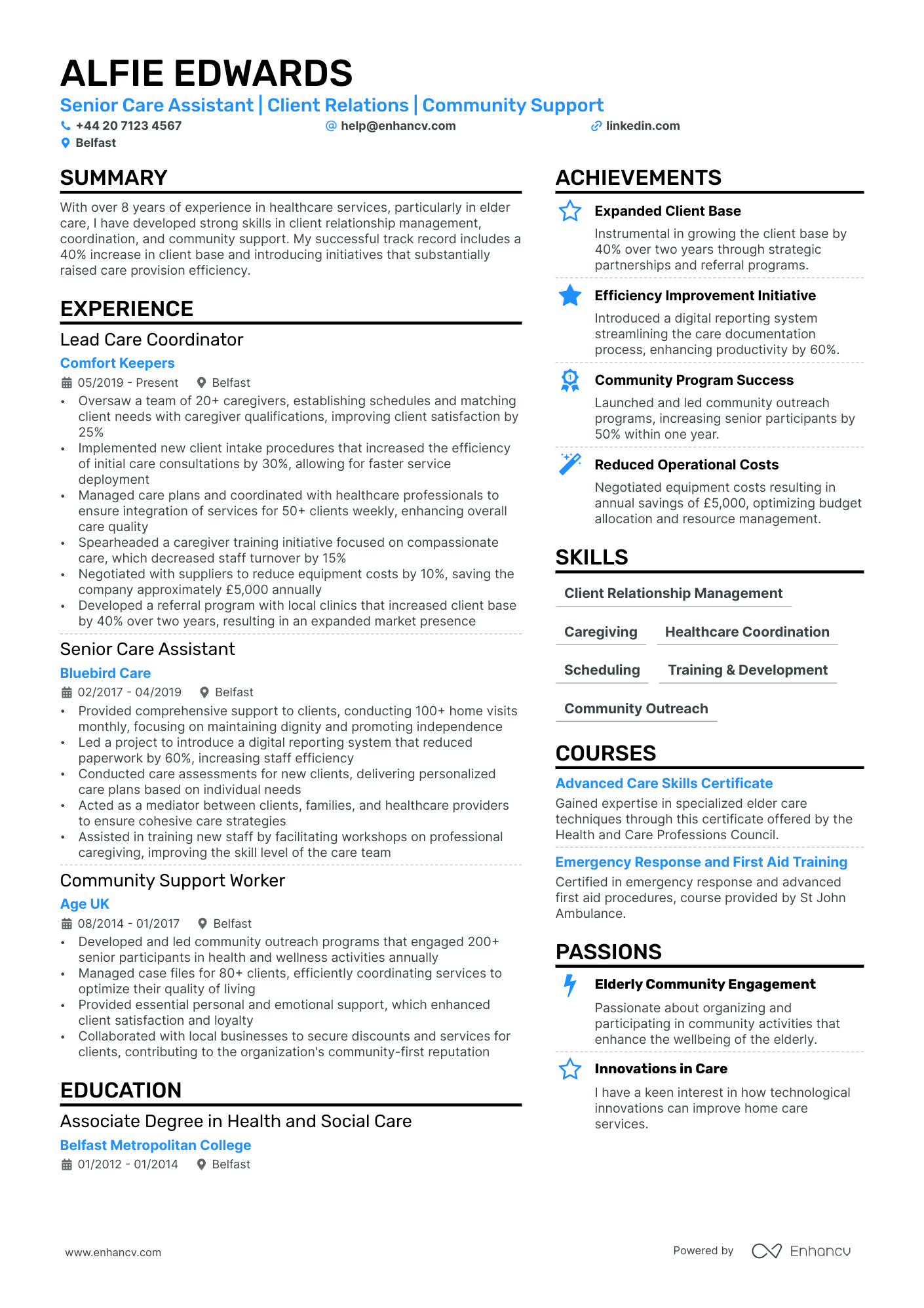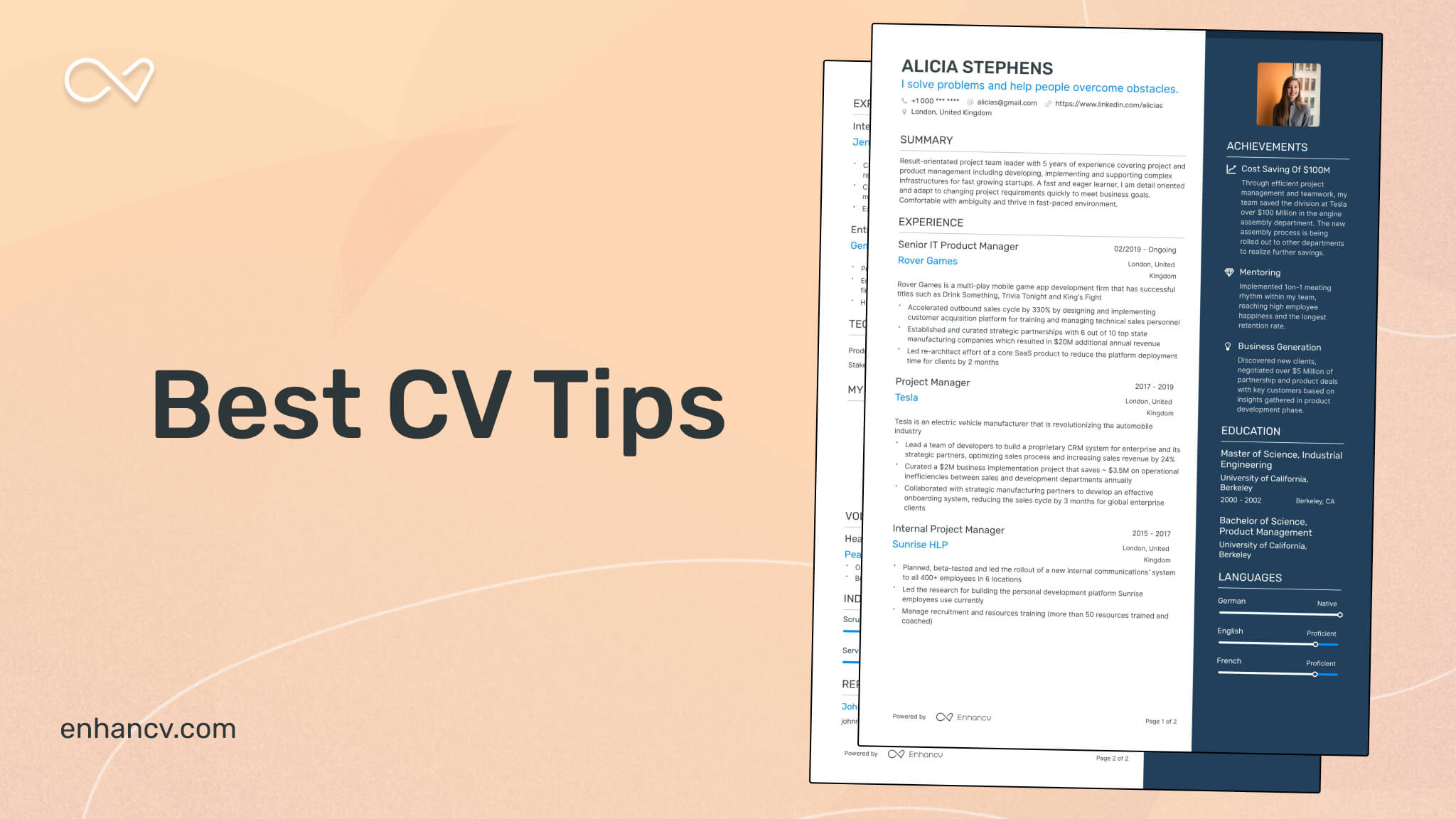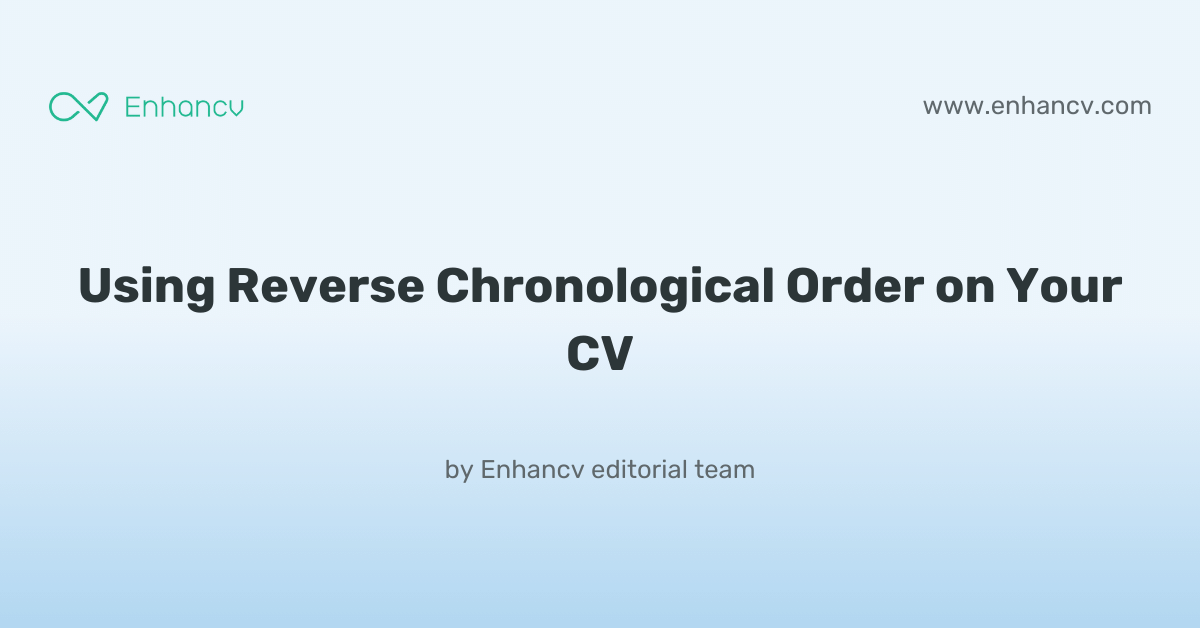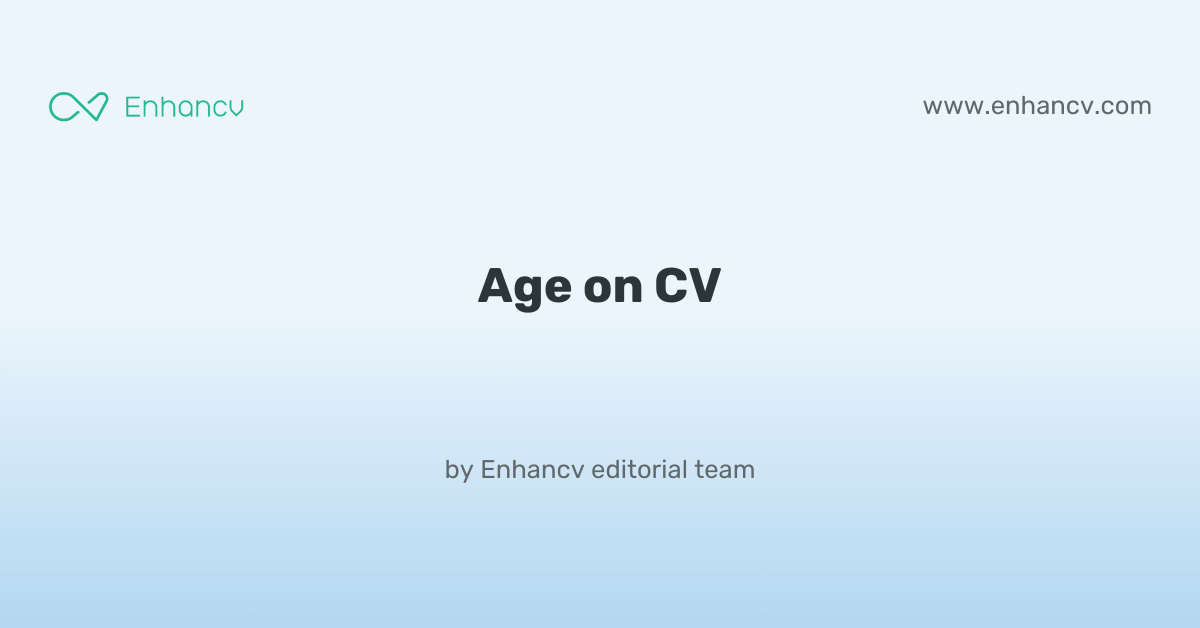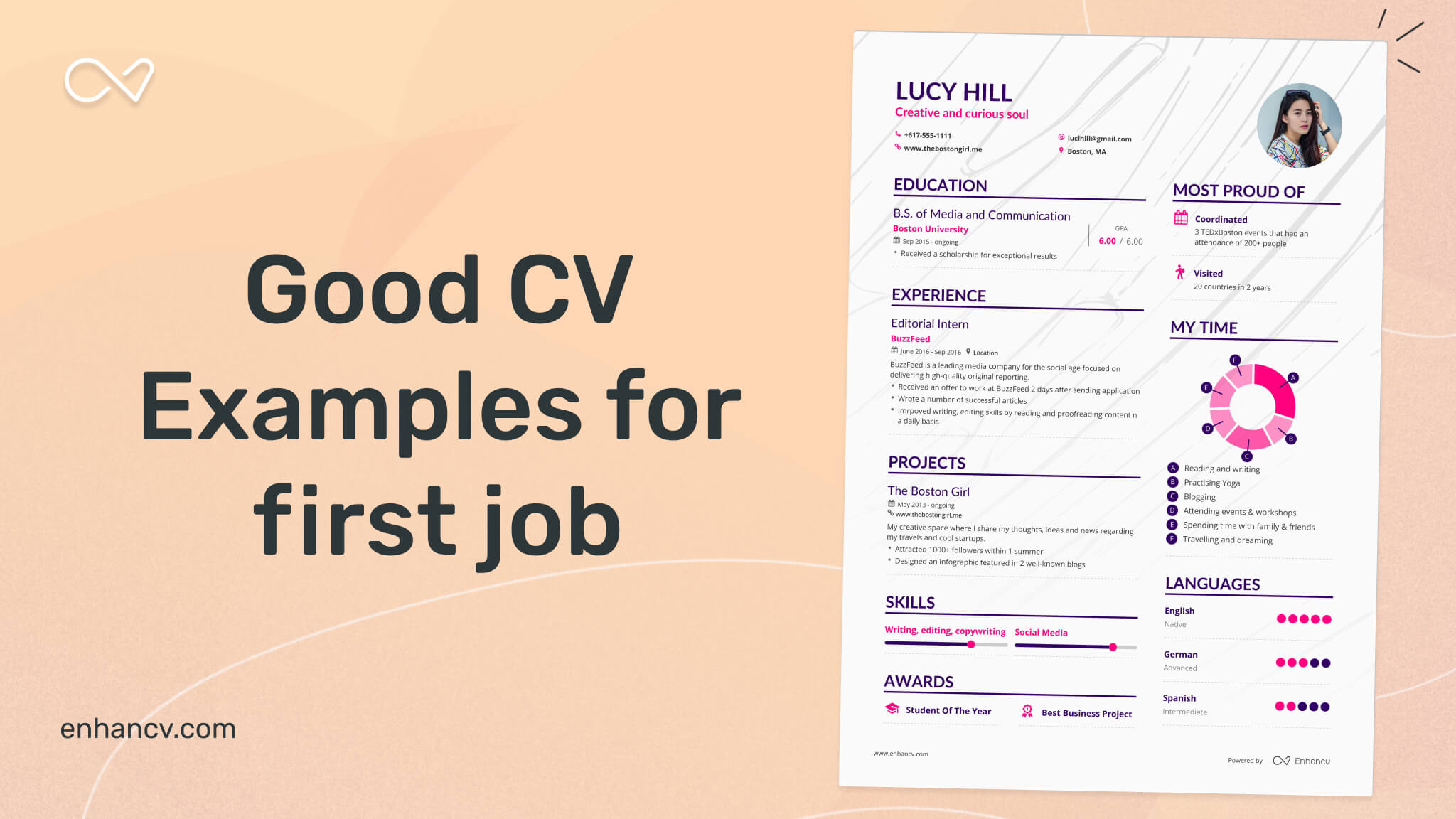Crafting a CV that stands out can be especially challenging for a care assistant given the competitive nature of the job market. Our guide provides expert tips on how to highlight your unique skills and experience, ensuring your application catches the eye of potential employers.
- Answer job requirements with your care assistant CV and experience;
- Curate your academic background and certificates, following industry-leading CV examples;
- Select from +10 niche skills to match the ideal candidate profile
- Write a more succinct experience section that consists of all the right details.
Do you need more specific insights into writing your care assistant CV? Our guides focus on unique insights for each individual role:
How complex should the format of your care assistant CV be?
Perhaps, you decided to use a fancy font and plenty of colours to ensure your care assistant CV stands out amongst the pile of other candidate profiles. Alas - this may confuse recruiters. By keeping your format simple and organising your information coherently, you'll ultimately make a better impression. What matters most is your experience, while your CV format should act as complementary thing by:- Presenting the information in a reverse chronological order with the most recent of your jobs first. This is done so that your career history stays organised and is aligned to the role;
- Making it easy for recruiters to get in touch with you by including your contact details in the CV header. Regarding the design of your CV header, include plenty of white space and icons to draw attention to your information. If you're applying for roles in the UK, don't include a photo, as this is considered a bad practice;
- Organising your most important CV sections with consistent colours, plenty of white space, and appropriate margins (2.54 cm). Remember that your CV design should always aim at legibility and to spotlight your key information;
- Writing no more than two pages of your relevant experience. For candidates who are just starting out in the field, we recommend to have an one-page CV.
One more thing about your CV format - you may be worried if your double column CV is Applicant Tracker System (ATS) complaint. In our recent study, we discovered that both single and double-column CVs are ATS-friendly . Most ATSes out there can also read all serif and sans serif fonts. We suggest you go with modern, yet simple, fonts (e.g. Rubik, Lato, Raleway) instead of the classic Times New Roman. You'll want your application to stand out, and many candidates still go for the classics. Finally, you'll have to export your CV. If you're wondering if you should select Doc or PDF, we always advise going with PDF. Your CV in PDF will stay intact and opens easily on every OS, including Mac OS.
PRO TIP
Be mindful of white space; too much can make the CV look sparse, too little can make it look cluttered. Strive for a balance that makes the document easy on the eyes.
The top sections on a care assistant CV
- Personal Statement: Showcases your passion for care work.
- Employment History: Highlights relevant care experience.
- Key Skills: Details specific caregiving abilities.
- Qualifications: Lists relevant care certifications.
- References: Provides contacts who can vouch for care skills.
What recruiters value on your CV:
- Highlight your passion for caregiving by sharing instances where you provided emotional support or went beyond the call of duty to ensure a patient's comfort and well-being.
- Detail any relevant qualifications such as NVQs in Health and Social Care or any specific training in areas like dementia care, which are highly sought after in care assistant roles.
- Emphasize your communication skills, showcasing times you've successfully worked with other healthcare professionals or how you've dealt with difficult conversations with patients and their families.
- Illustrate your practical skills, such as administering medication or assisting with mobility, and any specialist equipment you are trained to use.
- Provide examples of your ability to maintain patient dignity and privacy, emphasizing situations where you have adhered to confidentiality protocols and respected cultural sensitivities.
Recommended reads:
Our checklist for the must-have information in your care assistant CV header
Right at the very top of your care assistant CV is where you'd find the header section or the space for your contact details, headline, and professional photo. Wondering how to present your the name of the city you live in and the country abbreviation as your address;
- are tailored to the role you're applying for by integrating key job skills and requirements;
- showcase what your unique value is, most often in the form of your most noteworthy accomplishment;
- select your relevant qualifications, skills, or current role to pass the Applicant Tracker System (ATS) assessment. Still not sure how to write your CV headline? Our examples below showcase best practices on creating effective headlines:
Examples of good CV headlines for care assistant:
- Senior Care Assistant | NVQ Level 3 in Health & Social Care | Dementia Support | 8+ Years
- Compassionate Caregiver | Elderly & Palliative Care Specialist | Safeguarding Expert | 5 Years Experience
- Dedicated Support Worker | Learning Disability Focus | Medication Administration | BTEC Qualified | 3 Years In-Field
- Qualified Care Assistant | Mental Health First Aider | Person-Centred Care Advocate | 10 Years’ Commitment
- Entry-Level Care Aide | Completed Care Certificate | Passion for Community Care | Volunteering Background
- Experienced Personal Carer | NVQ Level 2 | Inclusive Disability Support | Behavioural Strategies | 7 Years Experience
Choosing your opening statement: a care assistant CV summary or objective
At the top one third of your CV, you have the chance to make a more personable impression on recruiters by selecting between:
- Summary - or those three to five sentences that you use to show your greatest achievements. Use the CV summary if you happen to have plenty of relevant experience and wish to highlight your greatest successes;
- Objective - provides you with up to five sentences to state your professional aims and mission in the company you're applying for
CV summaries for a care assistant job:
- Dedicated Care Assistant with over five years of hands-on experience in providing compassionate care to elderly residents in residential care homes. Skilled in administering daily medication, assisting with mobility, and crafting engaging daily activities. Recognised for significant contributions to increasing overall patient satisfaction at Greystone Care Home.
- Compassionate professional with 3 years' expertise in hospital settings, adept at providing critical support for individuals facing physical and cognitive challenges. Expert at designing personalised care plans and seamlessly collaborating with multidisciplinary teams to enhance patient outcomes. Recipient of the 'Caregiver of the Year' award at St. Luke's Medical Centre.
- Former retail manager transitioning to healthcare with proven leadership skills and a deep-seated passion for helping others. Experienced in team management, customer service, and conflict resolution, eager to leverage these skills to contribute to high-quality care in a reputable care facility. Currently pursuing an NVQ Level 2 in Health and Social Care.
- Motivated educator with a decade of experience in teaching and a genuine interest in geriatric wellness, seeking to change career paths into healthcare assistance. Brings strong communication skills, patience, and a nurturing demeanor vital for supporting the daily needs of care home residents. Enrolling in a Care Certificate course to sharpen relevant competencies.
- Aspiring Care Assistant keen to begin a meaningful career in health and social care, aiming to utilise my volunteer experience at local community centres and innate desire to support individuals in need. Committed to obtaining relevant qualifications while delivering empathy, dedication, and respect to residents and patients alike.
- Passionate individual with a background in customer service seeks to apply transferable skills in communication, problem-solving, and team collaboration to the caregiving sector. Intent on enriching lives while growing personally and professionally within the supportive environment of a progressive care facility.
Narrating the details of your care assistant CV experience section
Perhaps you've heard it time and time again, but, how you present your experience is what matters the most. Your CV experience section - that details your work history alongside your accomplishments - is the space to spotlight your unqiue expertise and talents. So, avoid solely listing your responsibilities, but instead:
- adverts' keywords and integrate those in your experience section;
- Use your CV to detail how you've been promoted in the past by including experience in the reverse chronological order.
Before you start writing your care assistant CV experience section, dive into some industry-leading examples on how to structure your bullets.
Best practices for your CV's work experience section
- Provided compassionate care to elderly clients, assisting with daily activities such as bathing, dressing, and grooming to maintain their dignity and quality of life.
- Administered medication as prescribed, ensuring the correct dosage was taken at the appropriate times to manage health conditions and prevent complications.
- Supported clients with limited mobility by safely transferring them between beds, wheelchairs, and seats, utilising hoists and other assistive devices to prevent injury.
- Monitored vital signs and reported any significant changes to the nursing staff, contributing to the timely intervention and management of potential health issues.
- Prepared nutritious meals according to dietary needs and preferences, encouraging proper nutrition and hydration to enhance overall wellbeing.
- Facilitated social activities and outings, providing emotional support and companionship to reduce feelings of isolation and promote mental health.
- Maintained accurate records of care provided, noting any variations in client condition or concerns, to ensure continuity of care and effective communication among the care team.
- Assisted clients with range of motion exercises and other prescribed physiotherapy routines to help maintain mobility and alleviate discomfort.
- Worked closely with other healthcare professionals, adhering to care plans and responding to emergencies, ensuring a coordinated approach to client care.
- Managed care plans for 30 residents with various levels of need, enhancing quality of life and adhering to care standards and protocols.
- Implemented a new digital reporting system that increased efficiency in monitoring vital statistics and patient updates by 25%.
- Led a team of 5 junior care assistants, providing mentoring and training that reduced staff turnover by 15% in the following fiscal year.
- Orchestrated weekly planning and coordination meetings to align a care team of 12 assistants with patient needs, improving patient satisfaction scores by 30%.
- Directed the care for 50+ patients, designing personalized care approaches that reduced hospital readmissions by 18%.
- Engaged in continuous professional development, completing a specialist course in dementia care, and subsequently improving the unit's dementia care approach.
- Facilitated timely and accurate medication administration to 40+ residents, with a zero error rate over a 3-year period.
- Leveraged expertise in mobility aid technology to provide tailored training for patients, boosting independence metrics by 20%.
- Developed and implemented a resident engagement program that increased participation in group activities by 70%.
- Initiated a healthy eating initiative across the care home, resulting in a 15% improvement in residents' nutrition-related blood markers.
- Navigated diverse family dynamics to facilitate end-of-life care for 20+ residents, ensuring dignity and support in their final days.
- Collaborated with external healthcare providers to coordinate comprehensive support services that enhanced patients' overall well-being.
- Adapted individual care plans for 25 residents with complex needs, maintaining a high standard of personalised support.
- Acted as a liaison between healthcare professionals and families, facilitating transparent communication and fostering trust.
- Contributed to a cross-functional project aiming to reduce falls within the facility by 40%, achieving a 35% reduction over the project timeline.
- Streamlined daily operations for a unit of 22 patients by implementing a time-management system that cut down task completion time by 10%.
- Promoted emotional well-being of residents by initiating a peer-support program, noted for a significant uplift in morale and community feeling.
- Organised and conducted staff training sessions in palliative care, raising the team's capabilities in providing end-of-life care.
- Conducted comprehensive assessments of new residents' healthcare needs, integrating findings into customised care provisions for over 35 individuals.
- Championed a volunteer program that brought in community members to engage with residents, enhancing social interaction and reducing feelings of isolation.
- Played a pivotal role in achieving a 95% satisfaction rating in annual care audits by delivering superior daily care and support.
- Spearheaded a patient-centered movement program in collaboration with physical therapists, helping to improve mobility for 90% of participants.
- Orchestrated a partnership with a local college for nursing students to gain practical experience, enhancing the care home's staff support by 20%.
- Piloted a new electronic health record system, training staff and ensuring a seamless transition from paper-based records.
Lacking professional expertise: how to write your CV to highlight your best talents
Don't count on your lucky stars when you're applying for a role, where you happen to have less (or almost none) professional experience. Recruiters sometimes do hire inexperienced candidates if they're able to present their unique value from the get-go. So, instead of opting for the traditional, CV experience section:
- List any applicable expertise you happen to have - no matter if it's a part-time job, internship, or volunteer work. This would hint to recruiters that your profile is relevant;
- Focus your CV on your transferrable skills or talents you've obtained thanks to your whole life and work experience. In effect, you'll be spotlighting your value as a candidate;
- Separate more space for your applicable academic background and certificates to show you have the technical know-how;
- Ensure that within your objective, you've defined why you'll like the job and how you'll be the perfect match for it. Always ensure you've tailored your CV to individual applications.
Looking for more good examples for your first job? We'll show you how other candidates, with less professional experience, have created their job-winning CVs.
Recommended reads:
PRO TIP
If applicable, briefly mention a situation where things didn’t go as planned and what you learned from it, demonstrating your ability to learn and adapt.
Hard skills and soft skills to showcase your unique skill set on your care assistant CV
Did you know that your CV will mostly likely be assessed by recruiters based on skill alignment? And that means that the way you feature your key skills across different CV sections will play a crucial role in landing you that first interview. We recommend you add your:
- technical capabilities or hard skills in your CV experience, certificates, projects, etc. Use your past accomplishments to prove your technical capabilities. List up to a dozen different software or hardware in your dedicated skills section to match the job keywords;
- personal and communication skills or soft skills in your CV strengths, achievements, summary/ objective, etc. Soft skills are a bit more difficult to prove. How do you define your aptitude in active listening? So, instead of just listing the skill name, include a tangible metric to show your success.
On a final note, when you're in a hurry to create your profile, you may misspell a particular technology or soft skill. That's why we suggest you copy and paste the particular skill name (or keyword), directly from the job advert. This would also help you to pass any initial Applicant Tracker System (ATS) tests.
Top skills for your care assistant CV:
Personal Care Assistance
Basic Medical Knowledge
Patient Lifting Techniques
CPR & First Aid Certification
Medication Administration
Nutrition & Hygiene
Health Monitoring
Record Keeping
Infection Control Procedures
Equipment Operation
Compassion
Communication
Patience
Attention to Detail
Multitasking
Time Management
Problem-Solving
Flexibility
Observation
Teamwork
PRO TIP
If there's a noticeable gap in your skillset for the role you're applying for, mention any steps you're taking to acquire these skills, such as online courses or self-study.
Your university degree and certificates: an integral part of your care assistant CV
Let's take you back to your uni days and decide what information will be relevant for your care assistant CV. Once more, when discussing your higher education, select only information that is pertinent to the job (e.g. degrees and projects in the same industry, etc.). Ultimately, you should:
- List only your higher education degrees, alongside start and graduation dates, and the university name;
- Include that you obtained a first degree for diplomas that are relevant to the role, and you believe will impress recruiters;
- Showcase relevant coursework, projects, or publications, if you happen to have less experience or will need to fill in gaps in your professional history.
PRO TIP
Use mini case studies or success stories in your CV to demonstrate how your skills have positively impacted previous roles or projects.
Recommended reads:
Key takeaways
What matters most in your care assistant CV-writing process is for you to create a personalised application. One that matches the role and also showcases your unique qualities and talents.
- Use the format to supplement the actual content, to stand out, and to ensure your CV experience is easy to comprehend and follows a logic;
- Invest time in building a succinct CV top one third. One that includes a header (with your contact details and headline), a summary or an objective statement (select the one that best fits your experience), and - potentially - a dedicated skills section or achievements (to fit both hard skills and soft skills requirements);
- Prioritise your most relevant (and senior) experience closer to the top of your CV. Always ensure you're following the "power verb, skill, and achievement" format for your bullets;
- Integrate both your technical and communication background across different sections of your CV to meet the job requirements;
- List your relevant education and certificates to fill in gaps in your CV history and prove to recrutiers you have relevant technical know-how.
